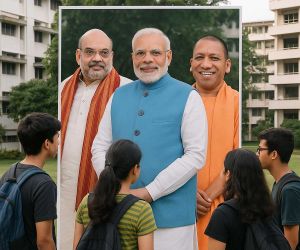MORE COVERAGE
Twitter Coverage
Satyaagrah
Written on
Satyaagrah
Written on
Satyaagrah
Written on
Satyaagrah
Written on
Satyaagrah
Written on
JOIN SATYAAGRAH SOCIAL MEDIA
"Breathless Truth": Gaurav Kundi, a 42-year-old Indian-origin man, is in a coma after an Australian cop knelt on his neck in a George Floyd-like arrest, sparking global outrage and raising concerns about rising racism and police brutality against NRIs

In the early hours of May 29, 2025, what began as a private, emotional moment between a husband and wife turned into a tragedy that now haunts the Indian diaspora across Australia. 42-year-old Gaurav Kundi, a father of two and an Indian-origin man living in Adelaide, was left critically injured and placed on life support following a violent encounter with South Australian police. The events unfolded on Payneham Road, in the seemingly quiet suburb of Royston Park, where Kundi and his wife Amritpal Kaur had stepped outside their home.
According to police accounts, officers were on patrol when they noticed what they described as an “altercation” between the couple. Gaurav Kundi was reportedly intoxicated and speaking loudly when his wife stepped out to de-escalate the situation. She later clarified to the media that her intention was to calm him down and convince him to come back inside, telling him plainly, “You are drunk… let’s get back home.”
But what followed next was a terrifying escalation. Amritpal Kaur explained that during their exchange, Kundi “just pushed me a little bit” in frustration — a moment she now believes drew the attention of the passing police car. Misreading the situation, the officers apparently assumed it was a domestic violence incident. Without seeking clarification, they moved in to arrest Kundi.
|
A George Floyd-Type Arrest – Caught on Camera
What happened next is eerily familiar to anyone who remembers the George Floyd incident in the United States — except this time, it was on Australian soil, and the man gasping for breath was a person of Indian origin.
Video footage, both from body-worn police cameras and from bystanders, shows the chilling sequence. Kundi is seen being forced down onto Payneham Road, while both he and his wife cry out in protest. He can be heard shouting, “I didn’t do anything wrong,” as officers wrestled him to the ground with growing aggression.
In the background, Kaur’s desperate voice pleads with the police, insisting they were making a mistake and that their response was “unfair.” But no one listened. During the struggle, Kundi lost consciousness. What pushed it beyond control was the shocking moment Kaur witnessed: she later told 9News that she “stopped filming” because she panicked — one of the officers had driven a knee into Kundi’s neck, much like Derek Chauvin did to George Floyd in 2020.
Terrified and sobbing, Kaur screamed for help, telling the officers, “he’s not well, he’s not well… just call the ambulance.” But by then, the damage had been done. One bystander’s video shows Kundi lying completely still, unresponsive on the pavement just moments after the forceful knee strike.
Paramedics were finally called, and Kundi was rushed to the Royal Adelaide Hospital. But what the doctors found was devastating. According to medical reports shared by the family and Australian media, his head had been slammed against the side of a police car and then into the road, causing extensive damage to his brain and neck nerves. Doctors feared the worst.
Amritpal Kaur, holding back tears, later revealed the bleak diagnosis: the doctors told them his brain was “totally damaged.” She added, “Maybe he will wake up if his brain works, or maybe he will not.” As of early June 2025, Gaurav Kundi remains on life support, in a coma, while hospital officials describe his condition as “critical”, with severe and possibly irreversible brain trauma.
As public outrage grew — especially among the Indian community in Australia — South Australia Police announced that an internal investigation had been initiated. The case was referred to the state’s Major Crime division.
By June 2, Police Commissioner Grant Stevens addressed the media. Having reviewed body-cam footage of the incident, he declared that the officers had “acted in line with their training.” This echoed the now-familiar refrain heard across Western law enforcement whenever a person of color ends up in the ICU or a morgue.
Acting Assistant Commissioner John DeCandia, in an interview with ABC Radio, added that he was “comfortable” with what he had seen of the officers’ actions. It was a statement that only deepened the distrust among those following the case. Despite the severe consequences of the arrest, no officer has been charged, nor have their names been released. Both remain on active duty, and no disciplinary action has been taken.
In response to mounting pressure, a Commissioner’s Inquiry has been launched. This inquiry is expected to review police procedures, use-of-force protocols, and how such cases are handled. Yet, with state authorities closing ranks, few are hopeful. Premier Peter Malinauskas chose to back the police publicly, stating that they had “a really difficult job” and deserved support for doing it.
Meanwhile, in a statement that felt almost scripted, the police department claimed that Kundi “violently resisted” arrest — a familiar phrase often used to deflect blame from authorities. As of June 3, the South Australia Police Department reiterated that it was “satisfied” with how its officers had acted so far.
|
Family’s Anguish and Indian Community’s Outcry
While Gaurav Kundi fights for his life in a hospital bed, his wife Amritpal Kaur has refused to leave his side. Grieving and overwhelmed, she has taken it upon herself to raise awareness about what truly happened that night. In multiple interviews, she clarified that the incident had been misrepresented by authorities. She emphasized repeatedly that the altercation was never violent or abusive, saying, “he is just drunk and that’s why he is loud.”
To her, what the police saw was not a threat — it was simply a misunderstanding between a husband and wife, one that spiraled into a nightmare due to hasty assumptions and unchecked force. Her voice trembling with emotion, Amritpal now lives each day surrounded by hospital machines and uncertainty, hoping the man she loves will wake up — and that someone, somewhere, will take accountability.
The Indian media, deeply shaken by the incident, has picked up her story and echoed her concerns. Prominent outlets across India have highlighted the shocking level of police force used, pointing to the video evidence where Kundi’s head was slammed into a car and the road, followed by a knee pressed into his neck. These images have sparked outrage across continents.
On social media, the Indian diaspora has erupted in anger. Hashtags like #JusticeForGaurav are being shared by thousands, calling for answers, justice, and transparency. What’s more disturbing is the silence of those in power. As of now, no official statement has been issued by the Indian government, nor has there been any acknowledgment from the Australian police union. For many, this silence is just as loud as the injustice itself.
|
Racism in Australia: The Elephant in the Room
What happened to Gaurav Kundi has done more than just shock the conscience — it has reopened old wounds. This is not just about one man. It’s about how people of Indian origin are still seen, treated, and marginalized in a country they call home.
With over 700,000 Indians now residing in Australia, they form the second-largest immigrant group in the nation, after British nationals. They are doctors, students, teachers, business owners — and yet, they continue to face prejudice and discrimination with alarming regularity.
A recent study reveals a stark truth: nearly 50% of Indian-born Australians reported experiencing racial or ethnic discrimination in just the past year — double the national average. This isn’t just a statistic; it’s a lived reality. The question is no longer “if” Indians will face racism in Australia — it’s “when.”
The racism isn’t always behind closed doors. It’s public. During the Australia-India cricket Test series, videos circulated online showing local fans mocking Indian spectators, chanting “where’s your visa?” A supposedly friendly sports environment became a space of xenophobic hostility. Experts have also warned about a troubling trend called “algorithmic racism,” where social media platforms unknowingly boost or normalize hateful content targeting immigrants — especially those of Indian or South Asian origin.
This isn’t the first time the world has watched Australia grapple with its treatment of Indians. Between 2009 and 2010, a wave of violent attacks on Indian students in Melbourne shocked both New Delhi and Canberra. The frequency and brutality of the assaults were so severe that Australia was forced to issue a formal apology to the Indian government. Then-Prime Minister Kevin Rudd flew to India to personally address the concerns. An inquiry was conducted by the Australia India Institute, which uncovered deeply rooted racial attitudes and systemic failures.
But have things really changed since then?
According to experts like Sukhmani Khorana of the University of New South Wales, this is part of a broader pattern. Some parts of Australian society, feeling “economically insecure,” lash out by othering successful migrants. The result? Individuals like Gaurav Kundi become the collateral damage of deeper societal anxieties — punished not for what they’ve done, but for what they represent.
This time, the world is watching. The Australian government’s response to the Gaurav Kundi incident will be a test. Will there be accountability, or will this case too be swept under the bureaucratic carpet?
Community advocates are making their stance clear. They say accountability must be non-negotiable. The Anti-Racism Framework consultations in 2023 had already emphasized the urgent need to acknowledge systemic bias and reform existing protocols. This case has thrown that urgency back into the spotlight.
Some argue that the police should be presumed to have acted fairly, and that we must wait for investigations to finish. But to those in the Indian diaspora, that trust is long broken. Many feel that despite their contributions and numbers, they are still treated as “other.” As Khorana rightly points out, visibility does not equal safety. Even as Indian-Australians grow in number, they remain vulnerable to unfair targeting, suspicion, and — as in Kundi’s case — irreversible harm.
The case is still unfolding. The South Australia Major Crime Unit and the Commissioner’s Inquiry are expected to release their findings soon. Kundi’s family, through their lawyer, have demanded full transparency and public disclosure of all investigation outcomes.
Meanwhile, Amritpal Kaur’s prayers remain unanswered. Her husband lies unresponsive, machines keeping him alive. She appeals to everyone — across Australia, India, and the globe — to not forget his name, to not let the footage fade from memory.
This is more than a tragedy. It is a wake-up call.
What happened to Gaurav Kundi was not an isolated incident — it is a symptom of a society where systemic bias against NRIs is growing, not shrinking. It’s a harsh truth, but one we must face: Australia is becoming one of the most dangerous places for Indian-origin residents.
No one will save you — not your friends, not your government, and not even the system you thought would protect you.
 |
 Support Us
Support Us
Satyagraha was born from the heart of our land, with an undying aim to unveil the true essence of Bharat. It seeks to illuminate the hidden tales of our valiant freedom fighters and the rich chronicles that haven't yet sung their complete melody in the mainstream.
While platforms like NDTV and 'The Wire' effortlessly garner funds under the banner of safeguarding democracy, we at Satyagraha walk a different path. Our strength and resonance come from you. In this journey to weave a stronger Bharat, every little contribution amplifies our voice. Let's come together, contribute as you can, and champion the true spirit of our nation.
 |  |  |
| ICICI Bank of Satyaagrah | Razorpay Bank of Satyaagrah | PayPal Bank of Satyaagrah - For International Payments |
If all above doesn't work, then try the LINK below:
Please share the article on other platforms
DISCLAIMER: The author is solely responsible for the views expressed in this article. The author carries the responsibility for citing and/or licensing of images utilized within the text. The website also frequently uses non-commercial images for representational purposes only in line with the article. We are not responsible for the authenticity of such images. If some images have a copyright issue, we request the person/entity to contact us at This email address is being protected from spambots. You need JavaScript enabled to view it. and we will take the necessary actions to resolve the issue.
Related Articles
- Saurabh Anand brutally attacked with a machete in Melbourne, nearly losing his hand, as global hate crimes against Indians rise—Charanpreet Singh beaten unconscious in Adelaide, Harsimrat Randhawa shot dead in Canada, and MEA confirms 30 killed
- "परदेशी": Akshay Gupta, a young Indian entrepreneur stabbed to death on a public bus in Austin by stranger without provocation, exposing a chilling trend of rising attacks on Indians in the US, with over 10 tragic killings since 2024 shaking the diaspora
- "चिट्ठी न कोई संदेश": Navjeet Sandhu, a 22-year-old MTech Indian student fatally stabbed in Melbourne over a rent dispute, sparking an urgent manhunt for suspects Abhijeet and Robin Gartan and a desperate family plea for his body's return
- Adding to the grim tally, Indian students Nivesh Mukka and Goutham Parsi killed in a fatal car crash in Arizona; both enrolled at Arizona State University, their untimely demise underscores the ongoing safety challenges faced by Indian students in the US
- Shweta Singh, a BDS student from Jammu found dead in her Udaipur hostel with a suicide note exposing staff harassment, sparking campus-wide protests, roadblocks, and cries for justice as students accused the college of crushing lives under pressure
- Telangana techie Mohammed Nizamuddin, 32, cried of racial hatred, wage fraud, poisoned food, and eviction before being tragically shot dead by Santa Clara police in US
- "घर आजा परदेसी": Harsimrat Randhawa, a 21-year-old Indian student killed by a stray bullet in a gangland-style shooting in Hamilton, Ontario, on April 16, one of six Indian student deaths in Canada in a year, sparking urgent calls for safety and justice
- 6 dead, multiple injured, including a 9-month-old baby & a pregnant woman in a stabbing attack at Sydney's Bondi Junction Westfield; Police have not ruled out terrorism as they investigate the tragedy, which saw a lone assailant fatally shot by an officer
- Four Indian-origin seniors vanished on a road trip from Buffalo to a West Virginia temple, last seen at a Burger King in Erie—days later, their car was found crashed off a steep embankment near Big Wheeling Creek, all four tragically confirmed dead
- "अलविदा": A 14-year-old boy & 12-year-old girl killed 80-year-old Bhim Kohli in Leicester’s Franklin Park, hurled a racial slur, filmed the attack as the girl laughed, broke his neck and ribs—his dog Rocky came home alone; both teens now await sentencing
- A 33-year-old Indian Cheistha Kochar, a bright LSE PhD candidate & ex-NITI Aayog employee run over by a truck while cycling back home; despite London's dense CCTV network, the absence of arrests a week on raises pressing questions of Indians safety abroad
- "No one left in family": Amarnath Ghosh, an exceptional Indian classical dancer & Washington University scholar, tragically murdered in St. Louis; body languishes in the morgue on day 6 as the Indian Consulate in Chicago urges a swift police investigation
- ‘Troublemakers’, ‘Radical elements’: Inside Donald Trump’s war on foreign students in the US, from visa freezes to SEVIS revocations, and how it threatens the future of 3 lakh Indian students and America’s $44B global education leadership
- "Rising racism grips Ireland": a 6-year-old Indian-origin girl punched in the face and hit in her private parts in Waterford, a cab driver left bleeding, a chef robbed, an Amazon worker stabbed, a data scientist disfigured—5 brutal attacks in a month
- "Even the slightest deja vu are supernatural incidents, we Hindus experience it a lot": IIT Chennai student Shubham Garg went to Australia for his PhD in Mechanical Engr at NSW was brutally stabbed 11 times with a knife in Sydney, family say racial attack

























